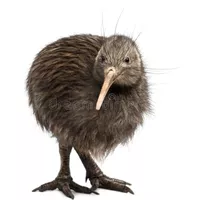Todd: So Rachel, you said that in your home country, New Zealand, there're lots of birds that don't fly?
Rachel: Yes, there are a lot of birds that don't fly.
Todd: Wow, so I only knew of the kiwi and of course the penguin, but I didn't know of other ones.
||||||||kiwi|||||pingüino|||||||
So first the kiwi.
It doesn't fly, right?
Rachel: That's the famous one.
Todd: Right.
Rachel: They don't fly but they can run very fast.
I've seen them.
Todd: Like and are the kiwi all over?
Like are there different types of kiwi?
Наприклад, чи існують різні види ківі?
Rachel: Yeah, there are several different varieties.
Рейчел: Так, є кілька різних сортів.
They're very rare though, and they're nocturnal.
||||||nocturnos
Але вони дуже рідкісні і ведуть нічний спосіб життя.
Todd: Oh, nocturnal.
||éjjeli
Rachel: I'd say most New Zealanders have never seen one in the wild.
|||||neozelandeses|||||||
Рейчел: Я б сказала, що більшість новозеландців ніколи не бачили його в дикій природі.
I've only seen them in Kiwi parks.
Todd: Oh, really.
Rachel: Yeah, you don't see them.
Todd: So, I thought they'd be like kangaroos in Australia, or something like you go and there's one.
|||||||canguros en Australia||||||||||
Тодд: Я думав, що вони будуть як кенгуру в Австралії, або щось на кшталт того, що ти йдеш і бачиш одного з них.
Rachel: No, they're very precious and very rare.
||||értékesek|||
One that you see more often is the pukeko which is ... it looks a little bit like a stork I suppose except it's dark blue.
||||||||pukeko||||||||||cigüeña||||||
Найчастіше ви бачите пукеко, який... він трохи схожий на лелеку, за винятком того, що він темно-синій.
Todd: What's it called?
Rachel: Pukeko.
Todd: Pukeko.
Rachel: Ah, yeah, and they're a lot more common.
And takahe is another one
|Y el takahe.|||
Todd: So the first one ...
Rachel: You can see them along the side of the road.
When you're driving through the countryside they're much more common.
Todd: So this pukeko, does it fly?
Rachel: No, they don't fly.
Todd: Really, and it's like a stork.
It has long legs?
Rachel: It has quite long legs.
Yeah, it a very cute little bird, but it's very dark.
Так, це дуже мила пташка, але вона дуже темна.
Todd: How tall is it?
Like up to your knee?
Up to your hip?
Rachel: Up to your knees.
Todd: Really.
Rachel: Cute little bird.
Todd: That's awesome.
So what was the other one you mentioned?
Rachel: Takahe.
|Rachel: Takahe.
It's very similar looking to that one.
Es muy similar a esa.
Він дуже схожий на цей.
It's a little different.
Es un poco diferente.
It's difficult to tell apart.
||||distinguir
Es difícil distinguirlos.
Їх важко розрізнити.
Todd: Really, and it's also kind of dark blueish.
||||||||azul oscuro
Тодд: Справді, і він також якийсь темно-блакитний.
Rachel: Yeah, another one's a kakapo.
|||||kakapo
Rachel: Sí, otro es un kakapo.
A very famous one.
Uno muy famoso.
It's New Zealand's flightless green parrot.
||de Nueva Zelanda|no volador||
Es el loro verde sin alas de Nueva Zelanda.
It's kind of like a large fat parrot that lives on the ground.
Es algo así como un loro grande y gordo que vive en el suelo.
Це щось на кшталт великого товстого папуги, який живе на землі.
Todd: Really.
Todd: De verdad.
Rachel: It's extremely rare.
||Rachel: Es extremadamente raro.|extremadamente raro
Rachel: Es extremadamente raro.
I'm not sure what the numbers are now, but around twenty years ago I think there were only 45 left
No estoy seguro de cuántos son ahora, pero hace unos veinte años creo que solo quedaban 45
Я не впевнений, яка зараз кількість, але близько двадцяти років тому, думаю, їх залишилося лише 45.
Todd: Oh, that is rare.
Todd: Oh, eso es raro.
Тодд: О, це рідкість.
Rachel: Extremely rare, so there's an intensive breeding program for them, and of course nobody's seen those in the wild.
||||||intensivo|cría intensiva||||||||||||
Rachel: Extremadamente raro, así que hay un programa de reproducción intensiva para ellos, y por supuesto nadie los ha visto en estado salvaje.
Рейчел: Надзвичайно рідкісні, тому для них існує інтенсивна програма розведення, і, звичайно, ніхто не бачив їх у дикій природі.
Todd: Yeah, you have to be careful or it'll go like the way of the Tasmanian tiger.
|||||||||||||||Tigre de Tasmania|
Todd: Sí, tienes que tener cuidado o terminará como el tigre de Tasmania.
Тодд: Так, треба бути обережним, інакше все піде, як з тасманійським тигром.
Rachel: Yeah, they breed and they nest on the ground.
|||crían|||anidan|||
||||||fészkelnek|||
Rachel: Sí, se reproducen y anidan en el suelo.
Рейчел: Так, вони розмножуються і гніздяться на землі.
They lay their eggs on the ground, so they're very vulnerable to introduced predators, to any animals.
||||||||||Vulnerables|||depredadores introducidos|||
Ponen sus huevos en el suelo, por lo que son muy vulnerables a depredadores introducidos, a cualquier animal.
Вони відкладають яйця на землю, тому вони дуже вразливі для інтродукованих хижаків, будь-яких тварин.
Todd: Yeah, I know that, you don't have snakes, but I know that snakes when they got into Guam they like decimated the bird population.
||||||||||||||||||Guam|||diezmaron|||
Todd: Sí, lo sé, ustedes no tienen serpientes, pero sé que cuando las serpientes llegaron a Guam, devastaron la población de aves.
Тодд: Так, я знаю це, у вас немає змій, але я знаю, що змії, коли вони потрапили на Гуам, вони ніби знищили популяцію птахів.
Rachel: Yep.
Rachel: Sí.
Так.
That's what would happen and that's why New Zealand immigration customs is very strict about what kind of animals you can bring in.
|||||||||||||szigorú|||||||||
Eso es lo que sucedería y por eso la aduana de inmigración de Nueva Zelanda es muy estricta en cuanto al tipo de animales que se pueden traer.
Це те, що станеться, і тому імміграційна митниця Нової Зеландії дуже суворо ставиться до того, яких тварин можна ввозити.
We don't even have snakes in zoos.
||||||zoológicos
У нас навіть у зоопарках немає змій.
Todd: That's smart.
Todd: Eso es inteligente.
Розумно.
Rachel: Michael Jackson famously came to New Zealand in the 1980's and wanted to bring his pet snake with him and he wasn't allowed to.
|||||||||||||||||serpiente|||||||
Rachel: Michael Jackson famosamente vino a Nueva Zelanda en la década de 1980 y quería traer a su serpiente mascota con él y no se lo permitieron.
Рейчел: Відомо, що Майкл Джексон приїхав до Нової Зеландії у 1980-х роках і хотів привезти з собою домашню змію, але йому не дозволили.
Todd: Oh, good on you.
Todd: ¡Oh, bien hecho!
Rachel: There were no exceptions to that rule.
Rachel: No hubo excepciones a esa regla.
Рейчел: Винятків з цього правила не було.
Todd: Are there any other birds that don't fly?
Todd: ¿Hay otras aves que no vuelen?
Тодде: Чи є ще якісь птахи, які не літають?
For example do you have penguins?
|||||pingüinos
Por ejemplo, ¿tienen pingüinos?
Rachel: Oh, yes, there's lots of penguins in New Zealand.
Todd: In the south right?
Rachel: Yeah, in the south.
Oh, they come up to the north sometimes.
Oh, a veces vienen al norte.
О, іноді вони підіймаються на північ.
Todd: Really, that far north?
Todd: ¿De verdad, tan al norte?
Тодд: Справді, так далеко на північ?
Rachel: Yeah, occasionally.
Rachel: Sí, ocasionalmente.
The big colonies are down south.
Las grandes colonias están al sur.
Todd: Ah, that's amazing.
Todd: ¡Ah, eso es increíble!
How cool.
¡Qué genial!
Any other birds that don't fly?
Rachel: Not that I can think of off the top of my head.
Rachel: No se me ocurre nada en este momento.
I'd have to look it up on the Internet.
|||||||lo|
Tendría que buscarlo en Internet.
Треба буде пошукати в інтернеті.
Todd: No, that's still though ... that's quite a few.
Todd: No, aún así... es bastante.
Тодд: Ні, це все ще ... це досить багато.
That's so nice.
Rachel: The most famous was the moa of course.
Rachel: El más famoso era el moa, por supuesto.
Todd: The moa?
Todd: ¿El moa?
Rachel: Which is an ostrich sized bird.
||||avestruz||
Rachel: Que es un pájaro del tamaño de un avestruz.
Рейчел: Це птах розміром зі страуса.
Todd: Oh, really.
Rachel: Yeah, but they were ... they were killed off before Europeans arrived in New Zealand.
Рейчел: Так, але вони були... вони були винищені до того, як європейці прибули до Нової Зеландії.
Todd: Oh, easy hunting.
Todd: Oh, caza fácil.
Rachel: They were easy hunting.
Rachel: Fueron una presa fácil.
Yeah.
Sí.
And a big feast.
|||Y un gran banquete.
Y un gran festín.
І велике свято.
Todd: It's funny how when you go to a place, you really want to see like a local animal, so last year I went to the Middle East.
Todd: Es curioso cómo cuando vas a un lugar, realmente quieres ver a un animal local, así que el año pasado fui a Medio Oriente.
I went to U.A.E and Oman, and I just wanted to see a camel.
|||||||Omán||||||||camello
Fui a Emiratos Árabes Unidos y Omán, y solo quería ver un camello.
I wanted to see a camel so bad, and I thought like I'd go down the road..
Quería mucho ver un camello, y pensé que bajaría por el camino..
Мені так хотілося побачити верблюда, і я подумав, що піду по дорозі...
Rachel: Everyone drives a Mercedes these days.
||||Mercedes-Benz||
Rachel: Hoy en día, todos conducen un Mercedes.
Рейчел: У наш час всі їздять на "Мерседесах".
Todd: and there'd be a camel, and I was kind of going out in the countryside.
Todd: y habría un camello, y estaba yendo un poco al campo.
Тодд: і там був верблюд, і я ніби виїжджав на природу.
I wasn't just in the city, and I never saw a camel, and I was asking people that work there, and they're like, "yeah, you do see them" but I was just so heartbroken that I never saw a camel.
|||||||||||||||||||||||||||||||||desconsolado/a||||||
No estaba solo en la ciudad, y nunca vi un camello, y le preguntaba a la gente que trabaja allí, y decían: 'Sí, los ves', pero yo estaba tan desconsolado de que nunca vi un camello.
Я не просто був у місті, я ніколи не бачив верблюда, я питав людей, які там працюють, і вони казали: "Так, ви їх бачите", але я був так розбитий тим, що ніколи не бачив верблюда.
Rachel: Ooh!
Rachel: ¡Oh!
Todd: It's one of my favorite animals.
Todd: Es uno de mis animales favoritos.
I just think they look so cool, so when I go to New Zealand, I have to make sure I see a kiwi.
Simplemente pienso que se ven geniales, así que cuando vaya a Nueva Zelanda, tengo que asegurarme de ver un kiwi.
Rachel: But you'll have to go to the kiwi house.
Rachel: Pero tendrás que ir a la casa de los kiwis.
Todd: The Kiwi House.
Todd: La Casa del Kiwi.
Rachel: The Kiwi House it's called.
Rachel: Se llama la Casa del Kiwi.
Or just look up zoos.
O simplemente busca zoológicos.
Або просто подивіться зоопарки.
Todd: And they got 'em?
Todd: ¿Y los tienen?
Rachel: Yep, they got 'em there.
Так, вони там.
But you won't just see them driving around.
Pero no solo los verás conduciendo por ahí.
Але ви не побачите, як вони просто їздять.
More English Listening Lessons for Language Learners
Más lecciones de escucha en inglés para estudiantes de idiomas

